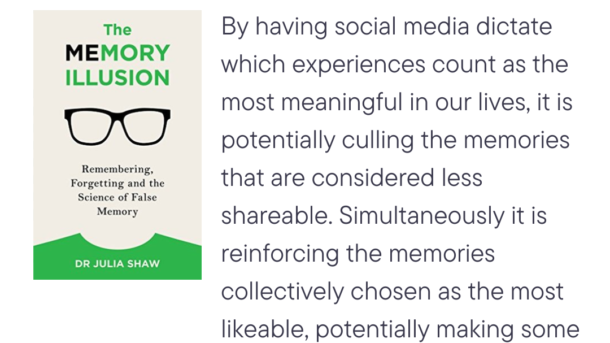But, from trying to divide our attention more, to having the potential for misinformation to come from virtually anyone, to putting less effort into remembering facts because we can just Google them later, there is also a far more problematic side to social media memory. Having intrusive social media prompts and notifications constantly reminding you of certain events and thrusting more and more information at you also has the potential to severely distort your reality. This is in part related to the retrieval-induced forgetting effect we discussed in Chapter 3. Every time we remember something, the network of cells that make up that memory becomes active, and that network has the potential to change and lose the details about which we do not directly reminisce. For example, say you are reminded on Facebook of a vacation. The prompt may be a single photo of the event with a caption. As you remember the particular moment in which the photo was taken, it is possible, even likely, that you are forgetting related and unmentioned information of other things that happened during the day. Of course, it’s not just social media that can have this memory-altering effect. Rehashing memories in any situation has the potential to distort them. What is different about social media is that the prompts are being selected from your online persona so they already represent a distorted, social-media appropriate, version of your life. This amounts to a double-distortion – distorting the memory in your brain with a previously distorted memory from your online persona. By having social media dictate which experiences count as the most meaningful in our lives, it is potentially culling the memories that are considered less shareable. Simultaneously it is reinforcing the memories collectively chosen as the most likeable, potentially making some memories seem more meaningful and memorable than they originally were. Both of these are problematic processes that can distort our personal reality. How do you know whether you are recalling your experienced reality or your online, crafted, reality? You probably can’t tell the difference, as social processes of remembering become magnified and have the potential to infiltrate in ways that were previously not possible. Social media and our ability to connect with others is introducing a fascinating new set of challenges and benefits that memory researchers are only just beginning to explore. It’s a brave new world, and we can all look forward to exciting developments in how we remember together.
What happens when the memories we retain are the ones that are the “instagrammable” ones? The very best ones that we’ve chosen to share, that distort the actual reality of the experiencea back then. While my instinctive reaction is that this isn’t good, I wonder what are the tangible negative impacts of living in a distorted reality where your memories were defined by what was deemed publicly acceptable.



